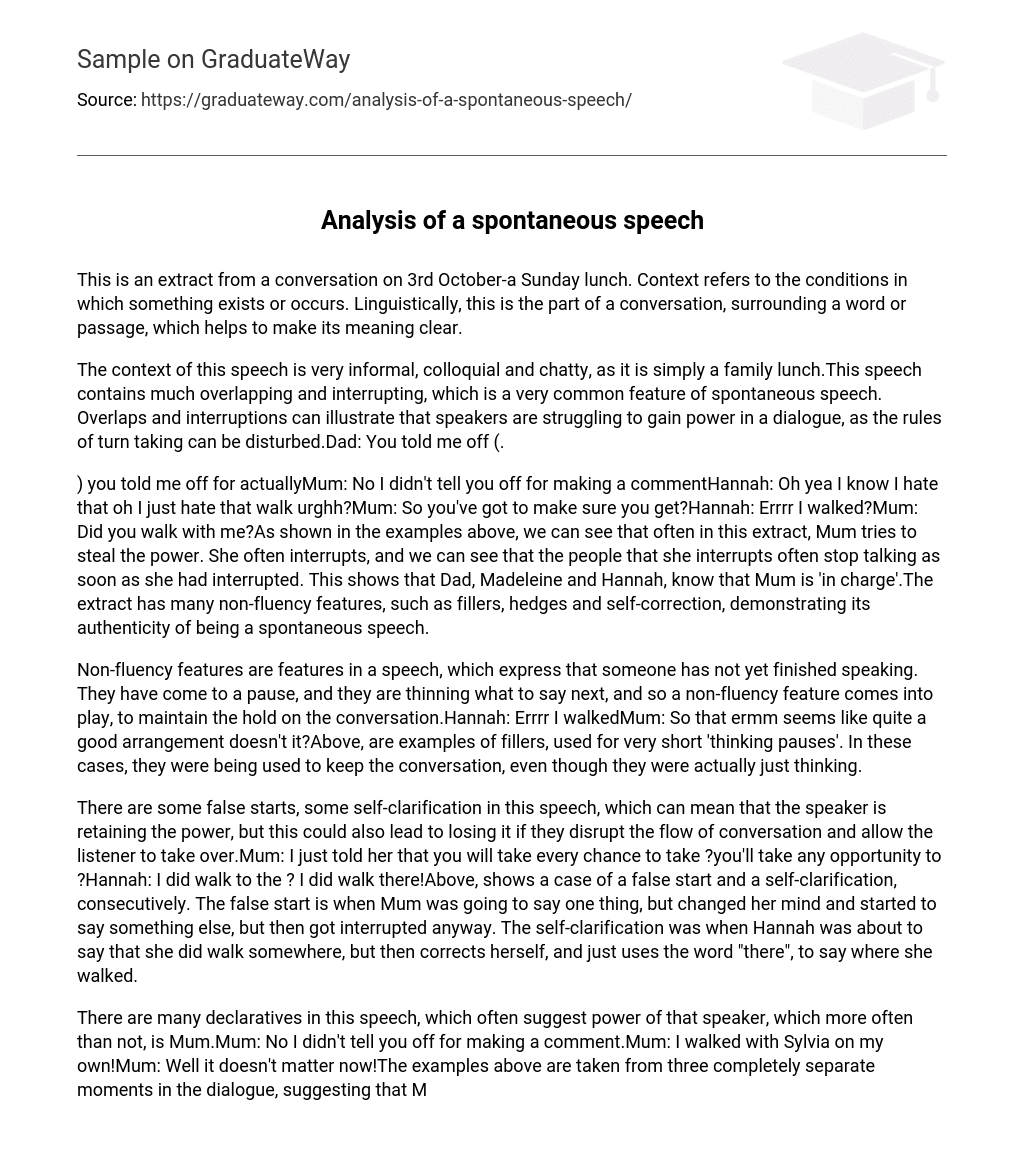This is an extract from a conversation on 3rd October-a Sunday lunch. Context refers to the conditions in which something exists or occurs. Linguistically, this is the part of a conversation, surrounding a word or passage, which helps to make its meaning clear.
The context of this speech is very informal, colloquial and chatty, as it is simply a family lunch.This speech contains much overlapping and interrupting, which is a very common feature of spontaneous speech. Overlaps and interruptions can illustrate that speakers are struggling to gain power in a dialogue, as the rules of turn taking can be disturbed.Dad: You told me off (.
) you told me off for actuallyMum: No I didn’t tell you off for making a commentHannah: Oh yea I know I hate that oh I just hate that walk urghh?Mum: So you’ve got to make sure you get?Hannah: Errrr I walked?Mum: Did you walk with me?As shown in the examples above, we can see that often in this extract, Mum tries to steal the power. She often interrupts, and we can see that the people that she interrupts often stop talking as soon as she had interrupted. This shows that Dad, Madeleine and Hannah, know that Mum is ‘in charge’.The extract has many non-fluency features, such as fillers, hedges and self-correction, demonstrating its authenticity of being a spontaneous speech.
Non-fluency features are features in a speech, which express that someone has not yet finished speaking. They have come to a pause, and they are thinning what to say next, and so a non-fluency feature comes into play, to maintain the hold on the conversation.Hannah: Errrr I walkedMum: So that ermm seems like quite a good arrangement doesn’t it?Above, are examples of fillers, used for very short ‘thinking pauses’. In these cases, they were being used to keep the conversation, even though they were actually just thinking.
There are some false starts, some self-clarification in this speech, which can mean that the speaker is retaining the power, but this could also lead to losing it if they disrupt the flow of conversation and allow the listener to take over.Mum: I just told her that you will take every chance to take ?you’ll take any opportunity to ?Hannah: I did walk to the ? I did walk there!Above, shows a case of a false start and a self-clarification, consecutively. The false start is when Mum was going to say one thing, but changed her mind and started to say something else, but then got interrupted anyway. The self-clarification was when Hannah was about to say that she did walk somewhere, but then corrects herself, and just uses the word “there”, to say where she walked.
There are many declaratives in this speech, which often suggest power of that speaker, which more often than not, is Mum.Mum: No I didn’t tell you off for making a comment.Mum: I walked with Sylvia on my own!Mum: Well it doesn’t matter now!The examples above are taken from three completely separate moments in the dialogue, suggesting that Mum has the power. Mum has many declarative statements when talking.
This suggests that she has the power.There is also the occasional interrogative in this speech. For example,Hannah: Was I ahead of you guys then?Mum: So that seems like quite a good arrangement right?The interesting thing about the above two examples, is that when Hannah uses an interrogative, she is actually looking for an answer. However, when Mum uses one, it is a rhetorical question, which again suggests that she has the power.
She uses a monitor, “right?” to check that the listener is following what is being said.This is clearly spontaneous speech, as there is much use of non-fluency features, false starts, overlaps and interruptions, fillers, hedges, self-clarification, monitors, elision and ellipses. Throughout most of this speech, Mum has the power, by using interrogatives, many declaratives, and by making many interruptions. However, at line 15, Mum loses the power to Hannah and Madeleine, when they take over the conversation, by changing the topic.
This is shown below, where it can clearly be sent hat Mum is trying to change the discussion topic, and line 34, the last line, Mum has regained the power, and set the agenda.Mum: Did you walk with me?Madeleine: Did you?Hannah: Yes. I walked with you and Sylvia ?Madeleine: Yea but that was half the way!Mum: Anyway ?Hannah: No I walked!Mum: Well it doesn’t matter now!Hannah: Why was I ahead of you guys then?Madeleine: Don’t know (3) Because you walked backwards and then you turned around andwent the other way again.Hannah: Oh well I don’t know all I know is that I did a lot of walking!Mum: So that ermm seems quite a good arrangement right? Hopefully my you’ll be ableto work on Boxing Day.
In summary, Dad says very little throughout the conversation, while Mum, Madeleine and Hannah share the power and agenda setting issues throughout. Mum has the most power, which is clear because she often interrupts, and by the end of the conversation, she has regained the power, without too much effort.





